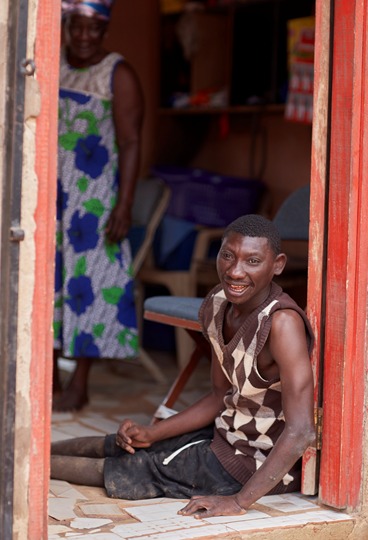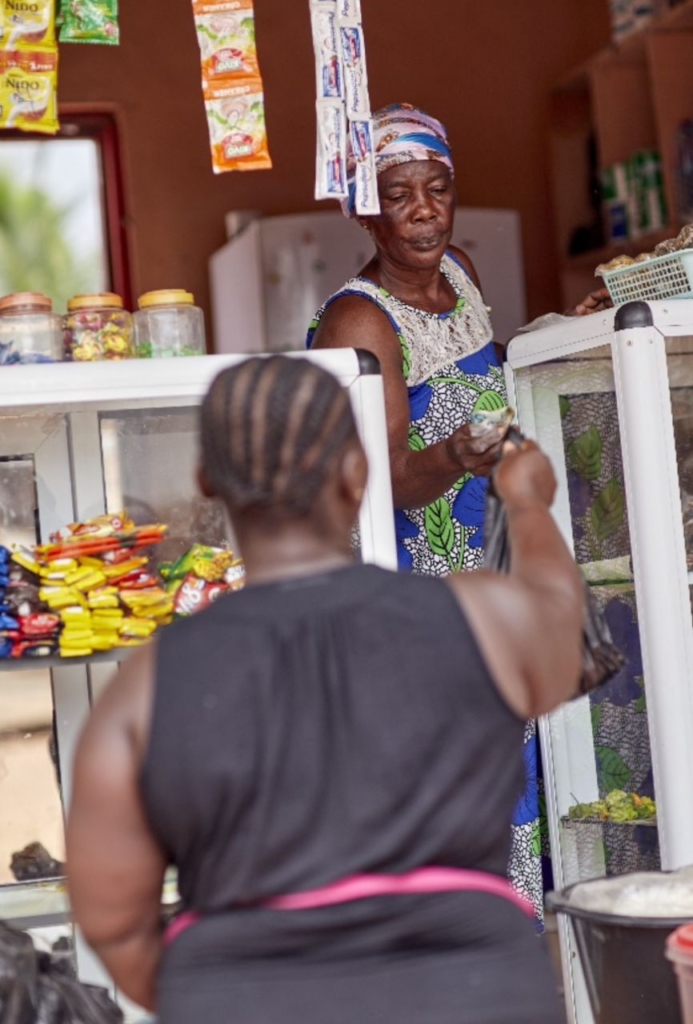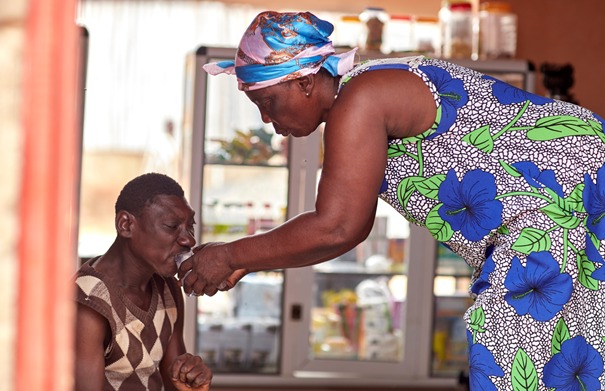In the quiet town of Abokobi, nestled underneath the Akuapim hills of Ghana, Mary Gbodzor and her 34-year-old son, Odartey Lanquey continue to thrive against all odds.
Odartey developed cerebral palsy at birth. Cerebral palsy is a neurological disorder that appears in infancy or early childhood and permanently affects body movement and muscle coordination.
Caused by damage to or abnormalities inside the developing brain that disrupt the brain's ability to control movement and maintain posture and balance, patients like Odartey are unable to move on their own and largely would need to rely on another human’s support to survive.
That is Madam Gbodzor’s cross to bear.
“I do everything for him, he can't eat so I feed him, and he can't bathe so I bathe him. My son’s condition has kept me in one place and I can't move without money how can I take care of myself? That's why they put me on the programme.”

Their story is one of hope and represents the transformative impact of the Livelihood Empowerment Against Poverty (LEAP) program.
Just like Mary Gbodzor, the LEAP program has become a lifeline for many vulnerable individuals and families. Designed to alleviate poverty and provide social protection, LEAP offers cash transfers to households identified as extremely poor, elderly, or living with disabilities. These payments are intended to support basic needs such as food, healthcare, and education, aiming to enhance the overall well-being and resilience of beneficiaries.
In a time where the data from the 2021 population and housing census by the Ghana Statistical Service reveals that about 7.31 million Ghanaians representing 24.3% of the population are multidimensional poor and 43.8% out of the 7.31 million, experience severe poverty. Thus, 7.31 million Ghanaians are in severe financial hardship depriving them of their basic human needs such as food, water, shelter, health, education and sanitation. It becomes necessary and important that social protection programmes like LEAP operate to cater for the basic needs of persons and families going through severe financial hardships.
Before LEAP, Mary and her mother made a modest living selling gari-a Ghanaian staple made from fermented cassava. However, the LEAP program marked a turning point for them. “They came to write our names in the town for the LEAP program”, Mary recalls. “Names of people who have sick children, and since then they have been giving us money.”
For the past seven years, the LEAP program has provided financial support to Odartey, allowing Mary to open a provisional shop in Abokobi. For three years through the support of the LEAP transfer, Mary has been running her provisional shop to support herself and her son Odartey whose condition has prevented her from moving away to work and make ends meet. The shop has been a lifeline for Mary and her family.

“If I didn't have this shop, things would have been difficult for me. Because without this shop and the things I am selling, nothing good will go on for me”.
Aside from having the shop, the LEAP transfer serves as a token to help her expand and to stock her shop with essentials like rice and biscuits, when she is out of products to keep her shop running. “When I receive the LEAP money, I check the things I don’t have in the shop like rice and biscuits and I use the money to restock.”

Social Policy Analyst and Researcher, Dr. Esther Aboagye Offei has been working with civil society groups that continue to campaign for the expansion and efficient delivery of social protection initiatives like the LEAP for years.
“Civil society appreciates the fact that safety net programs and programs like LEAP ensure that people live their lives meaningfully various studies have indicated that people can plan better and afford social services like health and education for their children, and even in some instances, some families were able to save a little and initiate some economic activities, may seek tabletop trading and that kind of thing, so that even though the argument is made that the amounts are inadequate or maybe small, they have come to mean an opportunity, something that can be looked forward to so that, life goes on. So sleep payments or cash transfer payments are very important”.
Since February 2024, when LEAP beneficiaries received cash transfers, beneficiaries have not received any payment showing a four-month delay in payment. This has presented challenges that have tested Mary’s ability to keep stocking her shop and catering for her son’s well-being. “For the 4 months that we have not received payment, I am trying to manage, I am waiting for them to pay so I can restock the shop.” Despite these challenges, Mary remains hopeful, supported by her community and reassured that LEAP remains a crucial lifeline during tough times.
Dr. Offei-Aboagye describes the delays in LEAP cash transfers as delays in monthly salaries which are meant to cater for the expenses and daily activities of an individual or a family and without it, the family or individual faces financial hardship and instability having an impact on their social and mental health.
“Delays in payments are like delays in salaries because, you know, it's supposed to come at a particular point in time. Even if you take a loan, you know that, by such date, the money will be in my account and therefore can defray your costs and so on, so that it impacts the person's ability to live their lives and procure certain things at certain times. It also impacts on their dignity. It impacts on their sense of self-worth. So delays like that are not just a matter of course. They mean somebody. They make a difference of life and death to a beneficiary” She added.
Aside from the cash transfer being a good support to families and individuals, Dr Offeri-Aboagye indicates that these transfers are a legal and economic right to social protection and are crucial for enhancing social capital and promoting economic growth.
As Mary goes about taking care of Odartey’s need, arranging provisions in her shop and selling to customers hoping for the next transfer to restock to avoid shortage and financial hardship, her story serves as a powerful reminder of the transformative impact of social protection programs like LEAP and the need to keep the program running smoothly without delays.
Latest Stories
-
BoG issues new exchange rate guidelines for shipping sector
1 minute -
AfDB reviews Ghana’s $850m development portfolio
10 minutes -
Jeffrey Nortey sparks conversation on fibroids with new skit
13 minutes -
KNUST honours agribusiness expert Daniel Acquaye; names drone training facility after him
14 minutes -
We’re not selling scholarships like tomatoes anymore – Youth Minister vows end to abuse
18 minutes -
Youth Minister demands end to state-sponsored scholarships for local courses abroad
48 minutes -
No law governs scholarships in Ghana – Minister admits, vows overhaul
1 hour -
GNPC has no business administering scholarships – Youth Minister
2 hours -
Ghana’s reputation on the line over ¢700m scholarship debt – Youth Minister admits
2 hours -
‘We will pay’ – Government scrambles to clear ¢700m scholarship debt
3 hours -
We inherited over GH¢700m in unpaid scholarship funds – George Opare Addo
3 hours -
Hunter Biden lashes out at George Clooney over father’s 2024 election exit
4 hours -
French cities impose curfews on children after drug violence
4 hours -
Will Ghana’s Broadcasting Bill ever be passed into law?
5 hours -
Hershey, Nestle, other cocoa companies defeat appeal of child slavery lawsuit
5 hours

